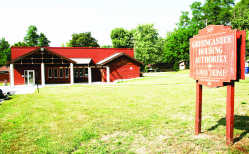Shelter need apparent, sustainability the big question

Now at six months and counting without a functioning homeless shelter in Greencastle, a core group of volunteers continues to ponder the project's long-term viability.
Conducting its third meeting in three weeks Thursday evening, the group focused its attention on the financial feasibility of the shelter and the creation of a Steering Committee to guide future decisions.
The first issue "sounds uncertain," admitted Bob Sedlack, one of the major volunteers along with fellow retired professors Walker Gilmer, John Dittmer and retired former St. Andrew's Rector William Wieland.
The second agenda item seems to have fallen nicely into place. Such community stalwarts as Ken Heeke, Chuck Schroeder, Ruth Ralph, Alan Barber, David English, Dave Bohmer, Bob Jedele and Jerry Lewis have joined the previously mentioned quartet to essentially comprise a Steering Committee that has agreed to continue meeting.
The group also agreed to further engage retired Bloomington shelter director Joel Rekas in continued exploration of local homeless shelter situation and its future.
To this point, Rekas, who since last September has been involved in researching A-Way Home operations and the potential for a future revival or creation of a replacement shelter, has been paid a stipend by Gilmer, Sedlack, Wieland and Dittmer.
The ad hoc committee suggested the group explore using $7,500 in leftover funds allocated to A-Way Home by the United Way to both pay Rekas and possibly fund a feasibility study.
The need for the feasibility study seems obvious to committee members.
"You don't reopen unless you have a sustainability plan -- bottom line," Bohmer asserted.
Rekas' original blueprint suggested a $187,000 first-year budget. However, it did not offer a plan for raising that kind of money.
"Joel wants the leadership to come from the community," Sedlack said. "When we bring Joel back, we have to define what we need him to do."
To that end, the cadre of community leaders offered a number of questions that need answers before proceeding much further with a project Gilmer and others hope to see revived by the Sept. 9 anniversary date of the shelter closing.
Is it sustainable? If not, how can services be done? How can it go about becoming a satellite agency? Is it more feasible to partner regionally with Parke, Clay or Owen counties, for example?
"To be fair," Bohmer pointed out, "haven't we answered the first question? We're not self-sustaining."
Heeke agreed. "History has proven that," he said.
History has also showed that A-Way Home had a good track record of securing local donations to help augment its overall budget.
From 2004-2011, donations to the shelter were never less than $42,773 annually, and that number was last year, when closing came in the ninth month.
Four times in recent years, former shelter Director Debbie Zigler, who has reportedly resigned recently at head of the Housing Authority, and her board were able to raise more than $50,000 (2007, 2008 and a high of $52,526 in 2009).
"I'm impressed by that," offered Schroeder, who is executive director of Putnam County Comprehensive Services and knows more than a little about fundraising.
Ralph suggested the committee certainly has assets to offer a potential future partner.
"We have a site," she said. "We have a history of fundraising and a will to do it ... that we have a place is huge."
The committee has pondered ultimately redefining that space to serve families without co-mingling them with single homeless men.
Regardless, focusing on servicing their needs is the issue.
Sedlack said he has had recent reports of homeless people living in a tent and their cars, as well as several bunking with friends and relatives whenever and wherever possible.
"Judy Miller (Food Pantry director) said she has been giving food to eight families that are homeless," he said.
Ralph offered another heart-tugging example of need.
"We have families that are homeless and we can't have them sleeping in the laundromat," she said, explaining that such a situation had apparently been occurring recently until the business owner put a stop to it.
"We have to do something," Ralph stressed.
As it has since the shelter issue emerged, the need seems quite obvious to the community and the committee. How to address it over the long term remains the quandary.
The group has volunteered to continue pursuing long-term possibilities with tentative plans to meet again at 5 p.m. Thursday in the basement conference room at the Putnam Partnership Center, 2 S. Jackson St., Greencastle.
